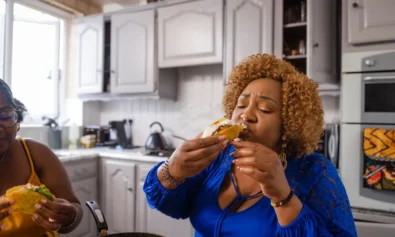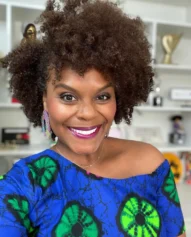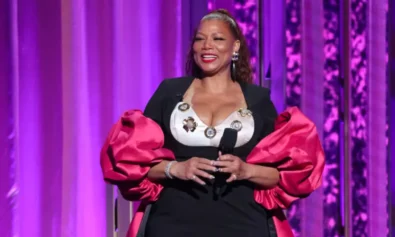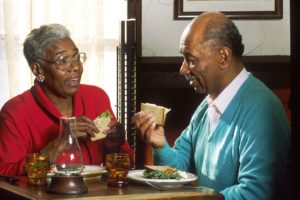
African-Americans are two to three times more likely than whites to battle cognitive impairment in their older years.Wikipedia.
June is Alzheimer’s and Brain Awareness Month. In its honor, people around the world have draped themselves in purple, pledging countless hours to help raise awareness and money for a cure.
Alzheimer’s is an irreparable, progressive brain disorder that wreaks havoc on the billions of tiny nerve cells housed within the organ, forever changing the individual. The chronic disease slowly erases a lifetime’s worth of hard-earned skills, cherished memories — and even people.
It is the sixth-leading cause of death in the United States, with more than 5 million Americans currently living with the disease. And the numbers continue to grow. The Centers for Disease Control and Prevention identified the ailment as one of the major contributors to a rise in the national death rate for the first time in a decade.
Alzheimer’s is especially damaging for African-Americans, who are 2.52 times more likely than whites to develop cognitive impairments later in life.
Although scientists have not been able to pinpoint an exact cause for the racial disparity, recent studies have indicated a number of medical and socioeconomic risk factors.
Last July, neurologists at the Rush Alzheimer’s Disease Center in Chicago studied the brains of patients who died from the disease and discovered that Black patients’ were more likely than whites to show signs of irregularities more commonly associated with Parkinson’s, heart disease and stroke, in addition to the oft-reported plaques and tangles found in most brains.
A more recent Michigan State University study suggested the racial disparity could be attributed to childhood disadvantages faced by many older African-Americans, such as growing up impoverished in the segregated South, and lower educational attainment in adulthood.
That’s why organizations like the African American Network Against Alzheimer’s are critical in spreading the word. The AANAA was launched in 2013 by USAgainstAlzheimer’s, an independent non-profit agency committed to increasing government, industry and scientific resources toward research for a cure.
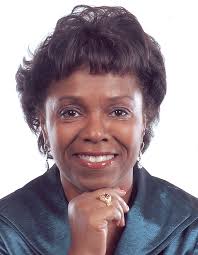
Stephanie Monroe, director of the African American Network Against Alzheimer’s.
The agency tapped the U.S. Education Department’s former Assistant Secretary for Civil Rights Stephanie Monroe for the role of executive director. The attorney has served as chief counsel for multiple Senate health committees in Washington, D.C.
She said the network understands the need for face-to-face interaction for what is often such a difficult conversation – especially for Black people.
“Because of the stigma that’s attached to mental health we don’t speak about it as that [kind of] issue,” Monroe told the Atlanta Black Star. “The first challenge, frankly, is to make people aware that the symptoms of Alzheimer’s disease are not normal. A lot of people in the African-American community — and I think so many older people depending on their level of awareness — believe that memory loss is a normal part of aging, therefore when they begin to see those symptoms they don’t seek help.”
But the degree to which memory loss occurs in Alzheimer’s sufferers is anything but normal, interfering with their ability to get through daily life. Grandpa forgets the kids’ birthdays again. Great Auntie can’t remember how to make her famous red velvet cake. Experts say one of the most common early signs is the inability to retain new information.
The group’s most successful initiative has been an award-winning stage drama called ‘Forget Me Not’ developed by Garrett Davis. The acclaimed playwright founded the Forget Me Not Project after losing his own grandmother to the disease.
“We can get those large numbers of individuals together, show them what the disease is so they can actually experience what the disease looks like, what the symptoms look like,” Monroe said.
The play travels to about seven cities each year, partnering with regional medical institutions. At intermission, a panel of local experts as well as a person living with the disease or a caregiver spend time talking about the disorder before taking questions from the crowd.
“I can’t tell you how many people have said, ‘I didn’t realize that my brother, my sister, my family member, this person probably has Alzheimer’s. Where can I go for help?’ And they leave that play wanting to do something.”
The demand for the popular play has been so high, the network hasn’t been able to keep up. They produced a live recording of the play scheduled for release on DVD in the next few weeks. Monroe said the DVD will be available to the public for a small contribution.
Another tough topic for African-Americans: clinical trials. Monroe said it’s a “big, big, big” issue in the community and one the network doesn’t shy away from.
“There [are] so many different opportunities to volunteer. It’s not just necessarily about taking medicine. We need to know what a healthy brain looks like. We need healthy subjects. We need people who are in the beginning stages of Alzheimer’s. People who may be afraid of it.”
Monroe counters ‘guinea pig’ concerns with a reminder of past medications that have failed to treat African-Americans as effectively as other populations.
“We’re different, and we need to be able to know what these differences are,” Monroe added. “Worse than not finding a cure is finding one and then finding that it doesn’t work for everyone.”
“Being mindful of people in your community who are maybe caregivers who really are the unsung heroes. They don’t get paid. [African-Americans are] only 13 percent of the population but we’re spending about 30 percent of the national costs of this disease and most of that is in caregiving.”
Monroe is referencing the 2013 report commissioned by the network on the economic burden of Alzheimer’s and other dementia for African-Americans, which found that while Blacks make up less than 14 percent of the U.S. population, they bear one-third of the nation’s total costs of Alzheimer’s and other dementias.
Other Key Findings:
• The annual cost to African-Americans for Alzheimer’s and other dementia in 2012 was $71.6 billion. Over 60 percent of the costs are taken on by families of Black women with Alzheimer’s and other dementia, and nearly half of the costs come from the South.
• Black Americans give $43.6 billion yearly in unpaid caregiving for their loved ones with Alzheimer’s — more than 17.4 billion hours.
• Though Medicare covered the majority of medical care expenses (59 percent) African-Americans still paid an estimated $554 million out-of-pocket.
• Black Americans between 40 and 64 years of age lost $6.1 billion (mostly from lost wages) in labor market productivity.

Darrell Gaskin, PhD, professor at Johns Hopkins Bloomberg School of Public Health
Even the report’s lead researcher, Darrell Gaskin, director at Johns Hopkins Center for Health Disparities, was surprised by the disease’s disproportionate impact on African-Americans.
“Alzheimer’s is not one of the priority conditions that we look at when we think about health care disparities,” Gaskin noted. “Typically we think about other chronic conditions such as hypertension, diabetes, cardiovascular and that’s where we’ve placed a lot of emphasis in terms of our policy.”
“That cost is really just a fraction of what the true cost [is] when you consider the psychic cost or the social cost that it has on the family. Because while people are caring for loved ones they’re not able to do other things that would be more productive and fulfilling for their lives.”
Both Gaskin and Monroe stressed the importance of support for the caregivers.
“Ask that caregiver: What do you need? Can I get you groceries? Would you like to get your nails done? Would you like to take a Friday off and go to a movie?,” Monroe said. “We have caregivers that get sicker and die sooner than the person they’re taking care of because they neglect their health. That’s what we encourage people to really think about: caregiver health.”
“It’s not something to be embarrassed about. It’s something that’s unfortunately too common…there are groups that are willing to help and have developed ways in which to provide support to the caregivers,” Gaskin said. “So don’t hide your loved one away and don’t you hide.”
